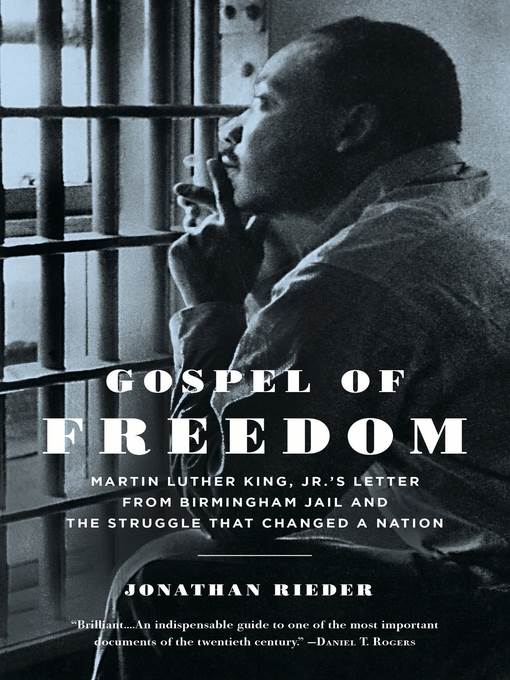
Gospel of Freedom
Martin Luther King, Jr.'s Letter from Birmingham Jail and the Struggle That Changed a Nation
کتاب های مرتبط
- اطلاعات
- نقد و بررسی
- دیدگاه کاربران
نقد و بررسی

February 11, 2013
In this study of King’s “Letter from Birmingham Jail,” Barnard College sociologist Rieder (The Word of the Lord Is Upon Me: The Righteous Performance of Martin Luther King, Jr.) places the Civil Rights leader’s important work in its historical and literary context. Rieder devotes a full 40 pages to setting the tumultuous scene in 1963. The meat of the book, however, is Rieder’s detailed analysis of the letter itself. Rieder meticulously identifies both subtle and overt shifts in King’s tone and intent, ranging from diplomacy to anger; by the second half of the letter, King “ mainly finished with explaining himself to his white critics. He is now ready to reprimand them.” Rieder assumes a familiarity with the text as he analyzes the letter and displays a remarkably deep knowledge of King’s larger body of work, with cross-references and connections to other sermons and writings. Perhaps the most powerful and instructive of these comparisons is in relation to the “I Have a Dream” speech, given a few months after the letter was penned. The book closes with a broad analysis of how the letter affected the fight for equality in Birmingham and how it continues to inspire. Agent: Susan Rabiner, the Susan Rabiner Literary Agency.

February 15, 2013
A tight, academic focus on the "Letter from Birmingham Jail" offers a fresh perspective on Dr. King's message. Few lives of the 20th century have been more richly, deeply and exhaustively explored than that of Martin Luther King Jr., and this study by Rieder (Sociology/Barnard Coll.; The Word of the Lord Is Upon Me: The Righteous Performance of Martin Luther King, Jr., 2008) draws heavily from that biographical literature. What distinguishes this work is the author's close reading of King's letter and his explorations of its origins and aftermath. By the time of King's jailing in Birmingham, it had been six years since he was featured on the cover of Time and generally proclaimed the leader of black America. The movement he led seemed to have stalled, and King felt besieged by criticism from both liberals and conservatives, blacks and whites, that he was too much of an extremist, too moderate, that his campaign of nonviolence was pushing too hard, too fast or was accomplishing too little. "Right up to the minute of his jailing, he felt disappointed and betrayed by blacks and whites alike," writes Rieder. Everyone from the New York Times to the Kennedy administration to local Alabama clergy was telling him that now was not the time for massive protest. Responded King in the letter, "This 'Wait' has almost always meant 'Never.' " The letter provided the "moral and philosophical foundations" for the movement and, in some ways, contrasts sharply with the more often invoked "I Have a Dream" speech: "On the surface, the 'Letter' and the 'Dream' could not have differed more: the rebuke to white inertia on one side, the joyous refrain of brotherhood on the other." By analyzing the "Letter" as both literature and moral imperative, Rieder adds to his subject's considerable legacy.
COPYRIGHT(2013) Kirkus Reviews, ALL RIGHTS RESERVED.

April 1, 2013
The letter that Martin Luther King Jr. penned from a Birmingham, Alabama, jail 50 years ago is one of the great calls for universal social justice that continues to inspire activists, as Rieder (sociology, Columbia Univ.; The Word of the Lord Is Upon Me: The Righteous Performance of Martin Luther King, Jr.) points out. The letter was King's impassioned response to eight white Birmingham clergymen who had appealed to him for moderation. Here Rieder first discusses the events that led to King's arrest, then addresses the letter's importance during the civil rights struggle. Although these events are described with more flair in the comprehensive King biographies by Taylor Branch and David J. Garrow, Rieder's middle chapters include richly detailed interpretations revealing King's brilliance as an advocate for equality. He portrays King the diplomat as a patient teacher who later transformed into a raging Old Testament prophet who forcefully condemned racism. VERDICT This book's significance lies in its interpretation of the letter, which was itself published later in 1963, and its insights into the often inscrutable King. See Clayborne Carson's Martin's Dream for a memoir of a King scholar inspired by the civil rights leader the same year this letter was written.--Karl Helicher, Upper Merion Township Lib., King of Prussia, PA
Copyright 2013 Library Journal, LLC Used with permission.

























دیدگاه کاربران